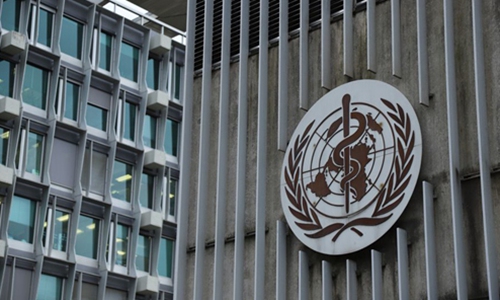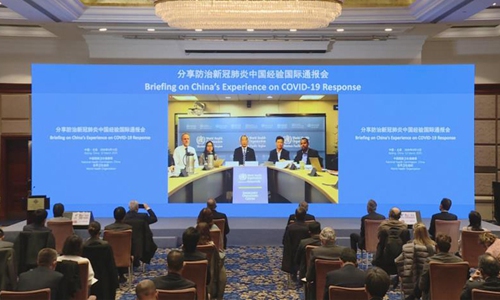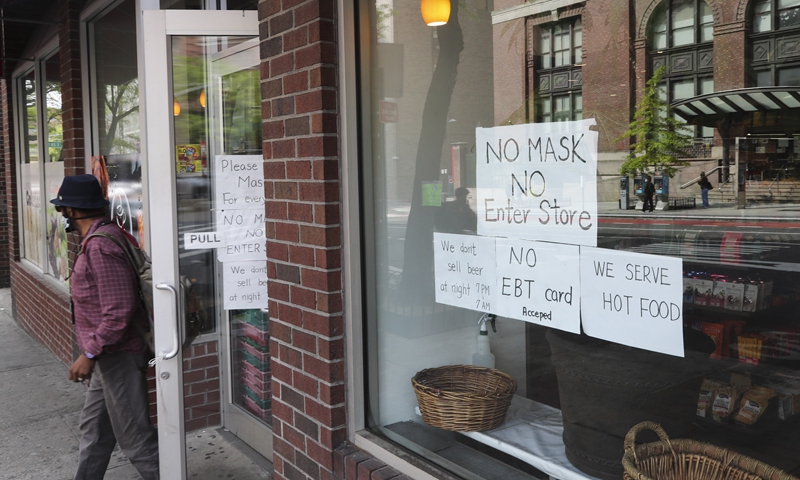WHO adopts draft resolution
US, Australia and Taiwan island ‘failed to besiege’ Chinese mainland

Photo taken on Jan. 30, 2020 shows the headquarters of the World Health Organization (WHO) in Geneva, Switzerland.(Xinhua/Chen Junxia)
A few days ago, the WHA meeting was widely considered as one with rising conflicts and divisions as more countries would target China and the WHO, seeking Beijing's culpability over the coronavirus outbreak - a malicious political attempt led by countries like the US and Australia. However, the two-day meeting closed with the majority of countries agreeing on a resolution co-sponsored by China, showing the global consensus reached on joint efforts in fighting the COVID19 disease and evaluating WHO's response in an comprehensive and objective way, experts said.
They noted that such consensus also rejected political bias led by some Western politicians, and major proposals highlighted by the resolution are in line with the consistent position of the Chinese side, which some Chinese analysts said could be seen as a diplomatic victory for Beijing.
The US, Australia and the island of Taiwan have become the largest losers at this year's WHA meeting, as they were either isolated or abandoned by the global community for continuing to politicize the pandemic and diverting the joint efforts in fighting this battle, some Chinese experts said. More than 120 countries agreed to a resolution carrying two key messages - identifying the zoonotic source of the coronavirus and evaluating the WHO's COVID-19 response, which was officially passed by the World Health Organization (WHO) on Tuesday.
The resolution also sent a clear message to the world that countries are sharing the consensus of taking the anti-epidemic battle as the top priority, recognizing the leading role the WHO has played, and evaluating the WHO's COVID-19 should be impartial and justified led by scientists and professionals.
The WHO voted and passed a seven-page resolution on COVID-19 response, after over 120 countries reportedly formed a coalition to come up with a draft paper, first proposed by the EU and later supported by countries like Australia and Russia. The resolution calls for support from all countries for their request to implement a multi-sector action plan in strengthening their health systems against the COVID-19 pandemic, working collaboratively at all levels to developing and scaling up effective and affordable diagnostics, therapeutics, medicine and vaccines, according to the paper seen on the WHO website.
The resolution also called for the use of existing mechanisms to review experience gained and lessons learned from the WHO-coordinated international health response to COVID-19. However, this initiative has been misinterpreted by some Western politicians and media outlets as being a probe into China's initial handling of the outbreak, first hyped up by countries like Australia.
By approving the resolution, the global community rejected the move of politicizing both the pandemic and the WHA meeting led by some Western politicians including Australian officials and American hawks by ignoring the Australia-backed probe targeting China, while not even mentioning the issue relevant to the island of Taiwan in its meeting agenda, no matter how hard Washington has been trying to push Taiwan's membership in the meeting with the aim of challenging the sovereignty of the China.

China's National Health Commission (NHC) and the World Health Organization (WHO) jointly hold a video conference to brief China's experience on COVID-19 response to international experts from various countries and representatives of some embassies in China and international organizations on Thursday. Photo: screenshot of the NHC
Three losersIn a complete and sharp contrast to China, which offered a series of proposals at the WHA meeting, including providing $2 billion over two years to help this battle, making China's COVID-19 vaccines global public goods when available and working with G20 members, the US has become the biggest loser for being isolated and marginalized, reflecting its failure in global governance, some Chinese analysts said, noting that such incompetence was amplified after it failed to besiege China at the WHO with the help of two of its biggest pawns - Australia and the island of Taiwan.
Contrary to China's commitment to the global anti-epidemic fight, US President Donald Trump escalated his "blame game" toward China and the WHO - an old-fashioned tactics used by some US politicians over the past few months in diverting public attention on their mishandling of the unprecedented public health crisis in the US.
Trump tweeted a letter to WHO Director-General Tedros Adhanom Ghebreyesus on Monday, in which he harshly criticized the organization's "dependence" on China in its decision-making process and COVID-19 response. Trump also wrote in the letter that if the WHO "does not commit to major substantive improvements within the next 30 days," he will make the temporary freeze of US funding to the WHO permanent and reconsider its membership of the organization.
"Trump got frustrated as he believes the WHO failed to accomplish the mission to help him pass the buck to China, and this is why he threatened to freeze its funding to the WHO," Li Haidong, a professor at the Institute of International Relations of the China Foreign Affairs University, told the Global Times on Tuesday. "The angrier he is, the more incompetent he becomes in handling the crisis," Li said.
Besides furious attacks, the US government has been trying to bring the matter of Taiwan into the WHA to provoke the Chinese mainland, which, however, was doomed to fail no matter how hard some US lawmakers and officials like US State Department spokesperson Morgan Ortagus tried to support the island and challenge the universally accepted one-China principle.

A store in New York, US, puts up a notice which reads "No Mask, No Entry" on Monday. According to data from the John Hopkins University, as of press time on Tuesday, the US has reported more than 1,508,900 confirmed cases of COVID-19, the largest number in the world with the death toll at more than 90,000. Photo: AFP
The attempt to push for proposals related to Taiwan at the WHA by the Democratic Progressive Party (DPP) in the island of Taiwan once again failed the moment the WHA announced it would not discuss such proposals.Only state members of the WHO have the right to attend the WHA. However, the DPP and pro-independence groups in the island of Taiwan have been working hard to push for Taiwan's attendance at the WHA "as an observer" since 2017.
Compared to previous years, Ms Keva Bain from the Bahamas, president of this year's WHA, was more "decisive and clear" about not discussing Taiwan-related proposals, experts said.
An insider familiar with this year's WHA said that so far, more than 160 countries have reiterated their support to the one-China principle and more than 50 countries sent letters to WHO General-Director Tedros Adhanom Ghebreyesus to oppose the Taiwan-related proposal.
Chinese mainland analysts said that the separatist DPP in Taiwan thought that it has found the "big brother" - the Trump administration - and it has paid a huge amount of money to flatter the US. But the "big brother" is not as reliable as they have thought, since all efforts they paid to challenge the one-China principle in the WHA failed, as always.
"They just don't get it. If they really want to be a WHA observer, the most effective path is through Beijing, not through Washington. That's why they are wasting money by begging the wrong boss but offend the one who can really help," a Beijing-based observer said, who requested anonymity. "What a hilarious behavior!"
The third loser was Australia, which has been actively pushing for a so-called independent inquiry into the origins of the crisis in recent days, aimed at China. Australia's act was widely believed to be instigated by Washington. Some Australian politicians, including Australia's foreign minister Marise Payne, Prime Minister Scott Morrison and Minister for Home Affairs Peter Dutton, have been in a bullish mood, as some media reports said, in criticizing China for its lack of transparency, and vowed to stand up for their values.
Failed attempts
Some Australian media outlets see this as a move aimed at further pressuring China and seeking to hold Beijing accountable for the outbreak, calling on Beijing to face overwhelming global pressure at the WHA meeting.
"This is a totally different thing from the so-called independent inquiry pushed by the Australian side," Zhao Lijian, spokesperson of the Chinese Foreign Ministry, told a routine press conference on Tuesday on the resolution approved by the international community. Along with other countries, China has been actively taking part in the negotiations on this resolution, which clearly recognizes and supports the leadership of the WHO amid the pandemic, he noted.
Some Chinese netizens also mocked Australia's attempts as it has been trying to become a "martyr" for defending so-called independence and transparency while its ideas were denounced by the global community. By following the steps of some US hawks who harshly attack China over coronavirus, "it seems that Australia, this giant kangaroo that serves as a dog of the US, will hit a deadlock with China on trade disputes in sectors like coal and beef. Hopefully, the US will compensate it!" one netizen said in a Weibo post on Tuesday.
Meanwhile, on the matter of Taiwan, some politicians and US media praised the island for preventing the pandemic and using this as an excuse to support the island to attend the assembly. But they ignored the fact that Taiwan has fewer infected cases simply because the mainland and shared all the information it got to the island at the earliest time, and Taiwan's necessary technical cooperation with the WHO have never been interrupted, Chinese analysts noted.
"Taiwan is an island which was almost automatically locked down from the mainland as it can connect with the mainland only by air and sea. And due to the worsening cross-Straits relationship, people-to-people exchanges between the two sides have been mostly suspended, so it is not hard for Taiwan to keep the number low," Li Xiaobing, a Taiwan studies expert at Nankai University in Tianjin, told the Global Times previously.
Compared to other Chinese provinces, Taiwan did not have the best performance. For instance, Jiangsu Province with more than 80 million people, about three times more than Taiwan's population, has only 51 confirmed cases and all were cured with zero deaths as of Monday, according to the latest data released by the Jiangsu provincial government website.
But Taiwan has 440 confirmed cases and seven deaths, according to Taiwan's public health authority.
Since the COVID-19 outbreak, the mainland also shared epidemic-related information and technologies with Taiwan 155 times as of Monday, and 16 groups of 24 experts from Taiwan have taken part in technical activities organized by the WHO since 2019.
Netizens from the mainland and island of Taiwan ridiculed the DPP for "betting on the wrong horse." "US President Trump and his administration have been haunted by the failure to control the virus domestically and are busy blaming China and the WHO. Why does the Taiwan authority rely on 'a partner' who is threatening to withdraw from the WHO?" a netizen surnamed Liu said.
While all parties have reached consensus on a draft resolution after consultations with member states, the Chinese side called for initiating a review of the WHO-coordinated COVID-19 response at the appropriate moment with an impartial, independent and comprehensive evaluation process to review experiences gained and lessons learned, which is also a routine practice for the WHO.
For instance, the WHO previously conducted a post-epidemic evaluation of the H1N1 response and Ebola.